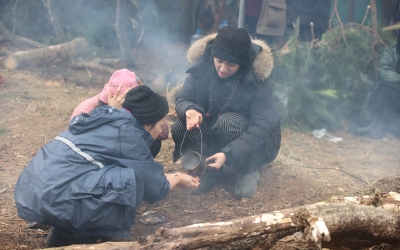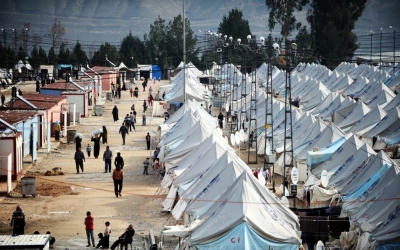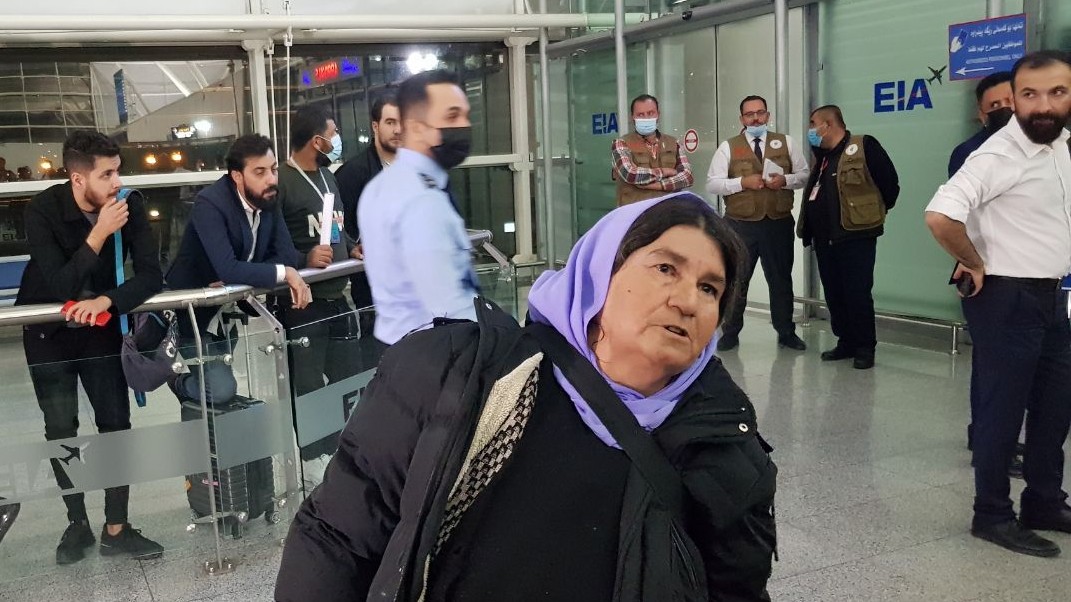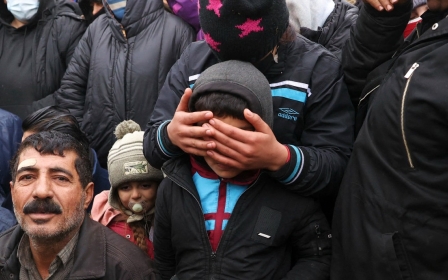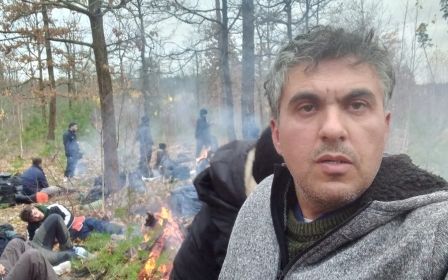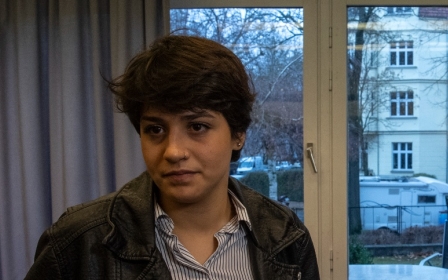Distraught Yazidi genocide survivors return from Belarus to Kurdistan
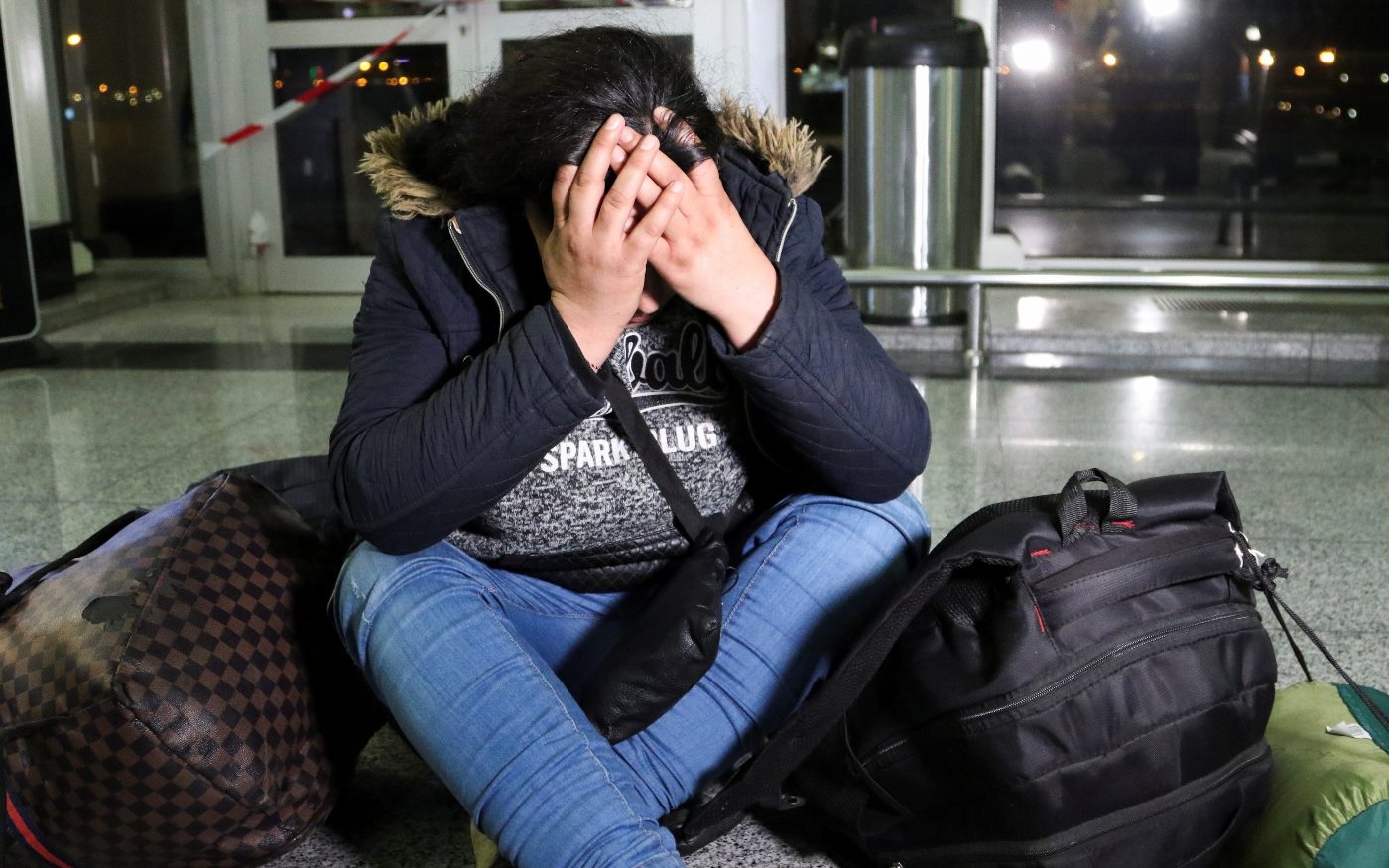
Around 430 would-be migrants arrived in the cities of Erbil and Baghdad in Iraq on Thursday evening, some covering their faces as their arrival was met by dozens of journalists at the Erbil International Airport (EIA).
Among them were mentally distraught Yazidi genocide survivors, who had been living in displacement camps in Iraqi Kurdistan before making their way to Europe.
An estimated 4,000 people were stuck on the Belarus-Poland border for weeks while attempting to cross into the European Union, until Minsk, in coordination with Iraqi authorities, moved to return a number of them.
At least 11 migrants have died due to the harsh winter conditions on the border, including a one-year-old Syrian boy.
Yazidis who returned to Erbil told Middle East Eye about their time in Belarus, years after surviving the brutal genocide carried out by the Islamic State (IS) group in the mid-2010s, during which thousands were killed, and thousands of women and children were brutally enslaved, with many still missing in Syria, Iraq or Turkey.
Naam Xelo, a 52-year-old Yazidi from the village of Tel Uzair, said 77 members of her tribe were killed by IS fighters in Sinjar in August 2014.
“Our situation was very terrible, we had our houses destroyed by ISIS,” Xelo told MEE, using another acronym for the militant group. “Our tents were also burnt [in the displacement camps]. We had nothing left, that’s why we left.”
After having gone through unspeakable hardship, Yazidis were left to face the fresh trauma of Belarus, and the return to Iraq empty-handed - with some deported families reportedly not even having enough money to pay for the taxi at Erbil airport.
Continued displacement and hardship
Hundreds of thousands of Yazidis are still living in displacement camps in Kurdistan, despite the defeat of IS in Sinjar by Kurdish forces in November 2015.
Many have chosen not to return to the area where there are few job opportunities, reconstruction is slow and local parties are locked in political disputes.
The unimplemented Sinjar agreement between Baghdad and the Kurdistan Regional Government (KRG) in October 2020 has so far failed to stabilise security and governance in Sinjar amid the continued presence of armed groups.
Poverty is on the rise in Iraq and Kurdistan, a situation that has been exacerbated by the Covid-19 pandemic. Last year Baghdad and Erbil imposed strict lockdowns that made it more difficult for displaced Yazidis to find jobs in restaurants or the construction sector.
Sozan Fahmi, the Iraq coordinator for the humanitarian organisation Khalsa Aid, told MEE that living conditions in camps such as Sharya were untenable.
“There are tons of reasons why Yazidi are leaving to go Belarus," she said. “NGOs are not able to do their work [due to the pandemic]... The Yazidi camps are not in the headlines right now, unlike in 2014 or 2015, when there were a lot of donors.”
Moreover, disputes with Baghdad over the Kurdistan region's share of the budget in recent years have led to repeated delays in salary payments and salary cuts for public employees, like teachers, health staff, and police officers.
To make matters worse, there have been several fires in the camps for displaced Yazidis over the last few years that have killed and injured civilians and destroyed many tents.
“These incidents terrify people and they do not want to stay in tents,” Fahmi said.
In June, around 400 tents burned down the Sharya camp that hosts Yazidis in Kurdistan’s Duhok province. The fire displaced 200 families, but no deaths were recorded.
“ISIS destroyed our houses, that's why we left houses and were displaced to Kurdistan and our tents were burnt in Sharya camp,” Dalya Xelaf, 24, told MEE.
“I want the Yazidis to leave the country, nobody is helping us, we have no rights.”
‘Cruel and criminal’
These difficult circumstances played a large role in pushing an as-of-yet unspecified number of Yazidis to make the dangerous trek to enter EU member state Poland, in hopes of seeking a better life.
But the catastrophic situation at the Belarus border has brought many back to square one.
Nisreen Haji Qasim, a 74-year-old native from Sinjar, said she and other migrants remained for days without water and food at the border.
“We have some family members who left Sinjar since the ISIS attack, and they are in Europe.
We wanted to join our children already in Europe, but we were not allowed,” she told MEE.
“No one allowed us to move, neither the Polish authorities nor Belarus. It was 10 days we were stuck.”
Asked if she could return to her hometown, she said that her family had “nothing left in Sinjar”.
“ISIS burnt our house already,” she said.
Murad Ismael, the co-founder, and president of the Sinjar Academy, told MEE that he has mixed feelings about the returns.
“On the one hand, I am glad they are safe and didn’t freeze to death,” he said. “On the other hand, they suffered, spent all their money, and went back to an empty and hopeless life.”
Some Yazidi families said they had spent around $20,000 for a family of four in order to make the long journey all the way to the Belarus border.
“With respect to the Yazidis, most feel their future in Iraq and Syria is uncertain and the slow recovery from the genocide just adds to the buildup of hopelessness,” Ismael added.
Pari Ibrahim, founder and executive director of the Free Yazidi Foundation, told MEE that the organisation has spent the last few weeks speaking to officials in the US and Europe about the crisis at the Polish-Belarusian border, particularly for Yazidis.
“While we fully understand Poland’s border concerns, it is important to understand who these migrants are,” she said.
'These are genocide survivors who are desperate, traumatised, cold, and suffering. If you look at the services offered to Yazidis in Iraq, you can understand why they leave'
- Pari Ibrahim, Free Yazidi Foundation
“These are genocide survivors who are desperate, traumatised, cold, and suffering. If you look at the services offered to Yazidis in Iraq, you can understand why they leave.”
Ibrahim added that countless Yazidis were out of work and had no means to make ends meet.
“The mental health of our people is deteriorating. The Yazidis are travelling out of suffering and desperation. Many of us are also furious with the smugglers and traffickers, in Iraq and in Belarus, who took advantage of the suffering. That is cruel and criminal,” she said, calling for migrants in Belarus to be provided with basics of shelter, food, water, and heating.
“Iraq and the KRG must bring to justice the criminals who took the money from these desperate families and left them in the cold forests of a foreign land, and make sure this criminal smuggling enterprise is stopped once and for all.”
KRG spokesperson Jotiar Adel told reporters during a press conference on Thursday that the regional government had formed a high committee with relevant agencies “to investigate the reasons people migrated to Belarus” in order to then “see what we can do for them in terms of rehabilitation”.
Adel told MEE on Saturday that the KRG was still working to collect data regarding where the Iraqis deported from Belarus were from.
“I don’t really know the number of Yazidis, but we are working on it,” he said. “We as the government know that migration is a natural phenomenon and exists in every country.”
He added that the KRG would take legal action against the human trafficking gangs involved in smuggling people to Belarus.
Ismael, meanwhile, hopes that “this wave of migration will invoke a national strategy to address the root causes of the problem”.
“I hope Europe will play a more active role in addressing economic and humanitarian issues for Iraq as a whole and especially for areas destroyed by war,” he said.
Middle East Eye propose une couverture et une analyse indépendantes et incomparables du Moyen-Orient, de l’Afrique du Nord et d’autres régions du monde. Pour en savoir plus sur la reprise de ce contenu et les frais qui s’appliquent, veuillez remplir ce formulaire [en anglais]. Pour en savoir plus sur MEE, cliquez ici [en anglais].


